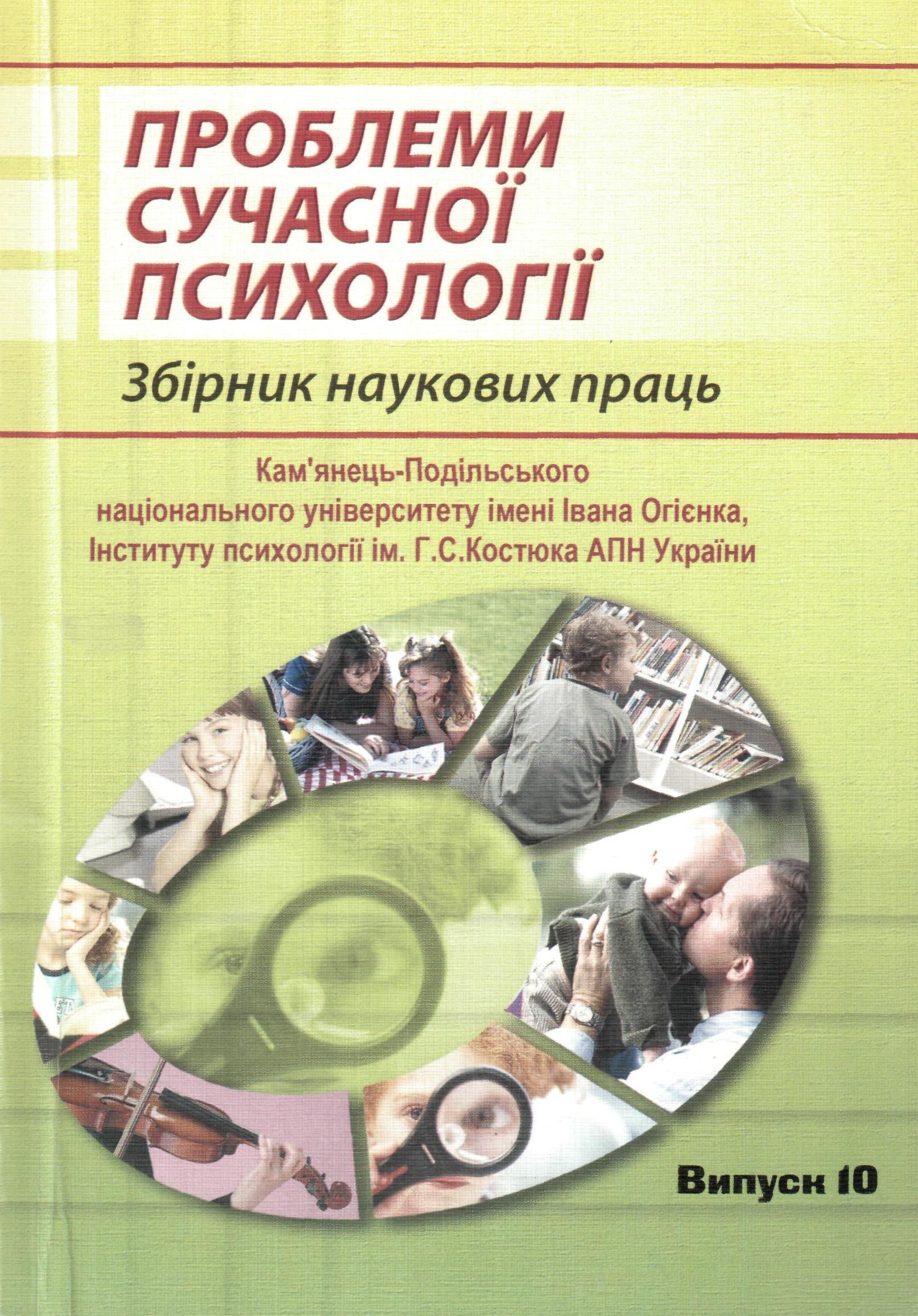Стилі та форми прояву гумору як гіпотетичні аспекти імпліцитної діагностики психологічного здоров’я
DOI:
https://doi.org/10.32626/2227-6246.2010-10.%25pKeywords:
гумор, психологічне здоров’я, імпліцитна діагностика, когнітивно-експерієнціальна теорія, позитивна психологія.Abstract
Наведено стислий огляд результатів сучасних досліджень різних
стилів і форм прояву гумору. Обґрунтована вірогідність зв’язку
особливостей реалізації гумору з ознаками внутрішнього світу особистості
та можливість здійснення на цій підставі імпліцитної діагностики
психологічного здоров’я.
References
Байєр О. О. Діагностика почуття гумору з метою визначення
стресостійкості суб’єкта / О. О. Байєр, О. Б. Харченко // Психо
логічні проблеми адаптації особистості до змінюваних умов жит
тєдіяльності: Тези доповідей всеукраїнської науково практичної
конференції. – Дніпропетровсськ: ДНУ, 2008. – С. 103 104.
Бергсон А. Смех / А. Бергсон // Психология эмоций. Тексты.
Под ред. В. К. Вилюнаса, Ю. Б. Гиппенрейтер. – М.: Изд во
Моск. ун та, 1989. – С. 186 191.
Бурлачук Л.Ф. Словарь справочник по психодиагностике /
Л.Ф. Бурлачук, С.М. Морозов. – СПб.: Питер, 2003. – 528 с.
Дмитриев А. В. Социология юмора: Очерки / А. В. Дмит
риев. – М.: Ин т философии РАН, 1996. – 214 c.
Зайва О. О. Особливості використання почуття гумору як
ресурсу психологічного подолання: Автореф. дис. … на
здобуття наукового ступеня кандидата психологічних наук /
О. О. Зайва. – Х., 2006. – 20 с.
Лук А. Н. О чувстве юмора и остроумии / А. Н. Лук. – М.:
Искусство, 1968. – 268 с.
Мартин Р. Психология юмора / Р. Мартин; пер. с англ. /
Под. ред. Л. В. Куликова. – СПб.: Питер, 2009. – 480 с.
Носенко Е. Л. Походження, зміст та форми виявлення гумору
як ресурсу психологічного подолання / Е. Л. Носенко, О. О.
Зайва // Вісник Дніпропетровського університету. Педагогіка
та психологія. – Дніпропетровськ, 2004. – № 7. – С. 22 31.
Носенко Е. Л. Сучасні напрями зарубіжної психології:
психологія особистості / Е. Л. Носенко, І. Ф. Аршава. –
Дніпропетровськ: ДНУ, 2010. – 305 с.
Фрейд З. Остроумие и его отношение к бессознательному / З.
Фрейд. – СПб.: Азбука классика, 2006. – 288 с.
Харченко О. Б. Гелотофобія як аспект виявлення емоційної
вразливості / О. Б. Харченко // Сучасні проблеми науки та
освіти. Матеріали 9 ї Міжнародної міждисциплінарної
науково практичної конференції 30 квітня 10 травня 2009
р., м. Алушта / Харків: Українська Асоціація «Жінки в науці
та освіті», Харківський національний університет імені В.
Н. Каразіна, 2009. – С. 143 144.
Peterson C. Character strengths and virtues: A handbook and
classification / C. Peterson, M. E. P. Seligman. – New York:
Oxford University Press, 2004.
Ruch W. Extending the study of gelotophobia: On gelotophiles and
ka tagelasticists / W. Ruch, R. Proyer // Humor: International Jour
nal of Humor Research. – 2009. – Vol. 22. – № 1/2. – P. 183 212.
Ruch W. Fearing humor? Gelotophobia: The fear of being laughed
at. Introduction and overview / W. Ruch // Humor: International
Journal of Humor Research. – 2009. – Vol. 22. – № 1/2. – P. 1 25.
Ruch W. The fear of being laughed at (gelotophobia) and per
sonality / W. Ruch, R. Proyer, D. Popa // Anuarul Institutului
de Istorie “G. Baritiu” din Cluj Napoca (Ed.), Series Huma
nistica. – 2008. – Vol. VI. – P. 53 68.
Downloads
How to Cite
Issue
Section
License
Copyright
The Editorial Board has the full right to publish original scientific papers containing results of theoretical and experimental research works which are not currently subject to review for publication in other scientific editions. The Author shall transfer to the editorial board of the Collection the right to spread the electronic version of the paper, as well as the electronic version of the paper translated into English (for papers originally submitted in Ukrainian and Russian) by all kinds of electronic means (placement at the official website of the Collection, electronic databases, repositories etc).
The Author of an article reserves the right to use materials of the paper, without approval with the editorial board and the founders of this Collection: a) partially or fully, for educational purposes; b) for writing own dissertation papers; c) for preparation of abstracts, conference reports and presentations.
The Author of an article can place electronic copies of the paper (including the final electronic version downloaded from the official website of the Collection) at:
- personal web resources of all Authors (websites, webpages, blogs etc.);
- web resources of the institutions where the Authors are employed (including electronic institutional repositories);
- non-profit public access web resources (for example, arXiv.org).
But in all cases, it is obligatory to have a bibliographic reference to the paper, or a hyperlink to its electronic copy placed at the official website of this Collection.






